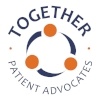You’ve just been diagnosed with a major health issue. Now what do you do?

Breathe
Don’t DO anything yet except breathe. For many people, being diagnosed will come as a big shock. Yes, it’s going to change your life in untold ways. But, take a second and breathe before you do anything else.
Share
Share with a loved one. Preferably someone who you know will give you the support you need right now. Don’t share the information widely at first. Hold off on that facebook post. Don’t announce it at work just yet. Take time to adjust to your diagnosis and sort out just who you want to know about your illness. Perhaps you’ll decide you want everyone to know--and that’s fine. But not just yet. Once you’ve shared the information you can’t take it back. If you work, you'll also want to explore your employment rights before you share the news with anyone you work with.
Search
Search out the main organization that advocates for your illness. For heart disease, this is the American Heart Association. For multiple sclerosis, the National MS Society. There’s a list of organizations for some of the major diseases here. Most of these organizations include good quality information regarding your condition, treatment options, etc. Many include a section for the newly diagnosed. This information can be invaluable. If researching your condition online, be sure to choose trustworthy sites.
Know
Know that while this diagnosis is going to significantly change your life, you WILL adjust and continue on. I don’t say this lightly--ten years ago, I was diagnosed with a life-altering condition. I went through all the stages of grief. I’m finally at acceptance (most days). I wish someone had told me at the beginning that I would be ok--even happy--again. Maybe I wouldn’t have believed them, but it would have been nice to hear. So, I’m telling you now: you will be happy again.
While grieving is normal, watch out for depression. A great therapist can be helpful for working through both grief and depression and sometimes medications are also necessary for the later. Awareness is key so that you can identify it early. Depression is a common adjunct of a number of chronic diseases and is also a common side effect of some medications used to treat them.
Support
Support from others with the disease helps to normalize what you’re experiencing. In-person support groups can be great for those with access to them and the ability to attend. If not, online support groups can be helpful. Some advocacy organizations run support groups for their illness. If not, there’s a Facebook group for every disease under the sun. Most are “secret” groups, meaning others on your feed can’t see what you post or that you’re in the group. This can make it tricky to find them, too. Do a general Facebook search for your condition and put out feelers for secret groups on the sites you do find. Some groups are helpful and supportive; others focus on the negative. Find the group that’s right for you. Check all information with your doctor before starting a supplement or “cure” that someone on the group recommends.
Build
Start building the right team. Make sure you have the doctor who is right for you. They should be willing to listen to your concerns and address them such that you understand the issues. It goes without saying that they should have expertise in your condition. You may need to seek a second opinion, especially if you have a rare condition or if you need to make a major decision about treatment.
Consider hiring an independent patient advocate. An independent patient advocate can be invaluable in assisting with a new or serious diagnosis, providing much needed education about the disease. They can assist you in finding those second opinions and ensuring that you are seeing a doctor who has the right expertise for you. Most importantly, they’ll help you advocate at your doctor’s office to make sure your concerns are addressed and the right treatment is prescribed. I can advocate for you in the Sacramento region. The National Association for Health Care Advocates and the Alliance of Professional Health Care Advocates also provide directories to help you search for the right advocate.
Whatever diagnosis you're facing, I wish you the best as you come to terms with what this new diagnosis means for you. Feel free to contact me if I can be of service to you.



.gif?width=200&name=NAHAC-Member-Badge200x112+(1).gif)


